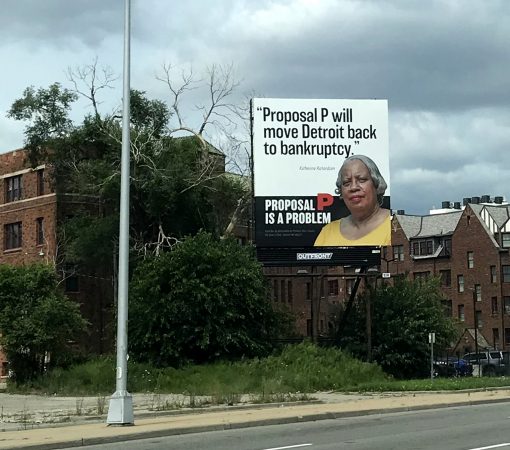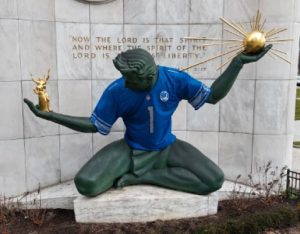The history of the United States is deeply linked with systemic abuse. It’s a simple statement and it’s not political, but a recognizable fact. The question is, how do we, in a society that is now coming to understand the maladies of its past, choose to recognize historical injustice and address its active consequences? Proposal P is on the table this week to support a Reparations Program.
156 years ago, on June 19th, Union General Gordon Granger rode into Galveston, Texas, to proclaim that all slaves were free. It’s a day we celebrate in the summer months and one we’ve talked about a lot this year as it’s just been named a national holiday. Juneteenth signifies a progressive and important moment, however, a romantic lens over our nation’s history might lead one to overestimate its consequence, to believe that the damage of slavery had ended when the last victim was freed or that it was the beginning of the end and next in the path for Black Americans was a linear trajectory toward equality.
Remove the lens and you’ll see that path has been tumultuous, with new trials emerging through the decades right up to the present day. Unequal land distribution from the homestead act, the Jim Crow era, the prison industrial complex, and redlining are only a few of the manifestations of systemic oppression toward Black Americans following slavery.
Inequality of the past caused by white supremacy has a direct relationship with the social inequality we consistently witness across the country today. The Federal Reserve estimated in 2019 that the median wealth of black families is less than 15% that of white families. It further assessed that the gap is not closing at any significant rate. Between 2016 and 2019 the difference in median family wealth only changed by $400.
An intervention is necessary. In a study on racial inequality and the various propositions to address it, Duke University researchers and economists “contend that the cause of the gap must be found in the structural characteristics of the American economy, heavily infused at every point with both an inheritance of racism and the ongoing authority of White supremacy.”
Because of this, the study concludes that Black Americans cannot close the gap by simply changing their behavior. Across the country, many of those sympathetic to their struggles have endorsed the argument for not only an apology as some municipalities have issued but for compensation.
In Detroit, many components of our city’s past contributions to the need for reparations. Highway systems were built through neighborhoods that divided communities, see the fall out of the Black Bottom neighborhood of Detroit. Racist housing policies helped lead to pronounced segregation and lending discrimination created other financial disadvantages.
The idea of reparations isn’t a new one. We’ve tried it before with various measures of success and failure while attempting to address disparities caused by the Native American genocide and after Japanese American internment camps during WWII.

HOUSE ON DETROIT’S WEST SIDE. THE REPARATIONS PROGRAM IN EVANSTON, IL, SEPARATES FUNDING FOR RESIDENTS TO REPAIR BLIGHTED HOMES AND PROVIDES MORTGAGE RELIEF. PHOTO LUCAS RESETAR
The more one considers the concept, the more questions arise. Who exactly qualifies to receive compensation? How do you assess a fair value for specific components of history? How is it paid for? Does the compensation manifest in cash payments or social programs?
It’s evident that the first step to instituting an effective reparations program is through research. The work cannot be done until we dissect the consequences of individual components of our history, the various institutions responsible, and the range of those affected. It would be irresponsible to attempt to remedy the issue without detailed analysis but also to dismiss the necessity of reparations before these consequences are truly understood.
On both a local and national level, discussion regarding the establishment of this exploratory infrastructure brings forth the true gravity of the controversy surrounding this topic. There are so many convictions textured to the point where little progress has been made.
Representative John Conyers first proposed H.R. 40 in 1989 and since then it has been reintroduced several times without

BLM PROTESTS 2020. RACIAL BIAS, PROFILING AND VIOLENCE ON BEHALF OF LAW ENFORCEMENT IS A LARGE COMPONENT OF SYSTEMIC RACISM IN AMERICA. PHOTO LUCAS RESETAR
resolution. On Tuesday Aug. 3, Detroit residents voted against Proposal P with 67% of voters standing against it. Many critics accused the charter revision of having a pie-in-the-sky agenda with impractical expectations. Some commentors expressed relief at the avoidance of what they perceived to be a danger to Detroit’s finances, and still, others theorized that a reparations program would violate the Michigan Constitution. All points seem to avoid the reality of how the charter is applied and of the fact that the reparations commission is an opportunity to explore and prove or disprove these claims in an official, academic capacity. At his Tuesday night election party, Mayor Mike Duggan praised his son for the work he’d done running the “Vote No On P” campaign in a moment that illustrates the very need for accountability and community engagement that the Proposal sought to address. Detroit resident’s vote on Proposal P, is an ambitious revision to the Detroit City Charter which, among many other things such as affordable water and greater public accountability, calls for a commission to study reparations with the intention to develop such a program in the City of Detroit. Although the Charter Revision established no specific mandates or laws, it’s proposal restructures a lot of the ways that government operates.
Denzel McCampbell is the Communications Director for Representative Rashida Talib. He is also running for City Clerk and worked on the Commission to create the Charter Revision. McCampbell says the new charter is “really trying to address the quality of life issues in the City of Detroit.” He says that during the commission’s public outreach, residents expressed that they did not feel heard, that the actions of the government had not reflected their needs and that there is not enough structure to ensure accountability in government.
Since it was drafted, the proposal has been pushed back against heavily. Initially, when it went before Governor Whitmer for approval, she denied it, citing various “legal deficiencies.”Attorney General Dana Nessel released an opinion that suggests that the proposal should be able to go on the ballot without the Governor’s approval. It was certified and immediately two lawsuits were filed. From there the proposal was ruled on in the Circuit Court, the Court of Appeals, and finally the Supreme Court just days before the vote. Every step of this process was a point of tension in the debate.
McCampbell says that he was very disappointed to see the Revision criticized for having legal deficiencies. “We spent time going through each one of the comments that the governor sent back (…) it was clarifying things, ‘point to this legislation, point to this law, point to this entity.’” McCampbell says that the commission’s general counsel found no legal deficiencies, only clarification points.
Dr. Hayg Oshagan, Founder of New Michigan Media and Co-Chair of the Immigration Task Force, helped draft the proposal by bringing community input to the commission. Oshagon corroborates McCampbell’s perspective saying he “was at the commissioners meeting when they went through the governor’s comments line by line. First, there weren’t that many. Second, it was the kinds of things that were understood.”
For example, if the consequences of the City Charter would install components of government that conflict with state law, then the state law takes precedence. “I’m not a lawyer but it seemed like they were trying to find a way to justify not supporting it and it was really minor stuff,” Oshagan says.
McCampbell describes the lawsuits filed against the proposal as acts of voter suppression. He and other commissioners contend that since the revision was democratically sanctioned by a vote in 2018, efforts to see it stricken from the ballot are inappropriate. “It’s an unfortunate tactic, cynical almost,” says Oshagan, “you may not agree with the charter, but let Detroiters vote on it. After all, it’s about all of us who live in this city. It’s about how people want their city to be governed.”
Detroit Mayor Mike Duggan has been one of the most outstanding public figures against Proposal P. Deputy Mayor Conrad Mallet defends the lawsuits saying that there is a strict obligation to go through the legal process and establish legal precedent. He says “once you begin to say that the rules are not applicable to every situation where the rules supposedly apply, you are then creating for yourself a precedent that you will not be able to ignore and you cannot, in this fractured circumstance we are operating in right now, have it both ways.”
However, Oshagan argues this point with the intention to give priority to the democratic process. He recognizes that the supreme court ruling will create a statute when considering the Michigan Home Rule Law which will affect other states, but he also says “there is always room for interpretation (…) the bar should be really high to pursue something in such a way that it denies people a right to vote on something that affects their own lives.”
The accusation that the lawsuits are a form of voter suppression is married to the implication that for those against the ballot question of Proposal P, there is an ulterior motive that drove the legal pressure. Oshagan does not shy from addressing this concern. “It’s a political maneuver,” he says, “if the charter didn’t challenge the authority of the mayor’s office, the independence of Police and Fire (Departments), as well as the provision of the police treatment of immigrants, they would have been less against it.”
Mallet says there is segregation between the concept of standing against the ballot question and that of standing against the content of the proposal. That theoretically “you can say that it should not be on the ballot and be for the contents of the revision.”
This does not, however, represent his position. Mallet says we should not “take something as complicated and as heart rendering as the whole discussion of reparations and turn it into a political football.”
Mallet endorses a reparations program, as well as Detroit City Council’s recent resolution to study reparations, but only with the stipulation that the application of the research is limited. He believes there should be no local ordinances or programs and any work in Detroit should only be conducted with the intention of “contributing to the national conversation.”
There are several reasons why supporters of reparations would argue against this limitation, not the least of which is the probability of seeing a program installed in the near future. In Detroit, there is considerable favorability for reparations, but that favorability is not representative of the nation as a whole. Senator Mitch McConnell reflected on the subject saying, “I don’t think reparations for something that happened 150 years ago, for which none of us currently living are responsible, is a good idea.”
Besides, there is evidence that a successful local reparations program is possible. The city of Evanston, Illinois, developed one over the last couple of years based on an intricate study of the racial discrimination exhibited in the municipality’s past.
It’s possibly inappropriate to consider either a national or local program with priority over the other. McCampbell suggests that both are necessary. “When we talk about reparations, it explores the role of various institutions and actors of slavery and systemic racism. If we’re thinking about a commission in Detroit, they’re going to have a specific role in the City of Detroit and the institutions and companies that operate here. On the federal level, they have a much larger scope.”
Arguably, the largest battlefield in this debate is over the cost. Governor Whitmer describes a financial crisis with an outcome reminiscent of that which Detroit experienced during the bankruptcy, where control over the city and school district’s finances are surrendered. Mallet expresses concern for the city’s pension fund saying that the charter revision brings risk to debt owed to pensioners. McCampbell calls these points bad faith attacks, scare tactics, and a disinformation campaign.
Detroit’s Deputy CFO, Tanya Stoudemire, presented a cost analysis of Proposal P which suggested that it would cost over $2 billion. The Charter Commission quickly refuted the quote. McCampbell inquires, “how do you come to those numbers when we don’t even lay out how the program is going to be implemented?”

IN ADDITION TO A REPARATIONS COMMISSION, PROPOSAL P SEEKS TO PROVIDE AFFORDABLE PUBLIC TRANSIT. PHOTO CASEY CONNELL / UNSPLASH
Mallet points to certain instances where some of the numbers may have come from. For example, there is a measure for free public transportation in the proposal and the city may have some idea of what that might look like from providing that service during the lockdown.
But the issue is the revision does not contain any mandates. At the end of the day, the City Council and Mayor’s office still have that authority.
Oshagan says there will be a small budget, but “if you say that it’s gonna cost the City of Detroit a billion dollars to pay reparations and then you add that to the cost of the Charter, you make it sound like the Charter is costing a billion dollars when it’s not actually, just the study of something doesn’t mean you have to pay money to do anything.”
The Reparations Commission would operate with the purpose of suggesting laws but it’s hard to say how that will look right now. Evanston is successfully funding its program with new revenue coming to the city through marijuana sales.
There have been other criticisms of the charter, for one, Former Mayor Dennis Archer spoke against the revision, telling Michigan Chronicle that “decisions can’t be made in silos without consulting other groups in the city to see how they might be impacted(…).” Mallet holds a similar opinion saying “this is not the opportunity for people to stand up, demagogue and say okay, we shape the City of Detroit budget”
Yet the majority of Oshagan’s contribution to the revision was bringing different voices to the table. A lot of the framework was based on the Detroit Bill of Rights. “It was very much a broad community-based engagement with the drafting of the charter,” he says, “this is one of the ways it’s been characterized to diminish the validity of the work.”
Both Oshagan and McCapbell suggest in their own words that these obstacles, from the lawsuits to the accusations of exclusion, stem from a deeper discomfort hosted by certain parts of our government, the discomfort of changing the status quo, of relinquishing authority, decentralizing power, and of submitting to accountability.
“Power is highly centralized in the Mayor’s office. The commissions and the multiple ways in which boards are composed under the charter diminish that centralization, create greater engagement and that weakens power and centralization in the mayor’s office,” Oshagan says.
He contends this is “one of the core arguments from that side that no one talks about much. What they do talk about is a bunch of commissioners coming up with things from the top of their heads. Which is not true.
Mallet expresses belief in a representative government that engages with the community independent of commissions and boards. He says the charter revision heralds disorder and is “by design creating chaos in the process of government again so that persons who have political aspirations can satisfy them.”
It’s interesting to consider the possible effects of the controversy inspired by this revision even after it is passed. For example, The Human Rights Commission would oversee the reparations commission established by Proposal P. Well the HRC is appointed by the Mayor with approval of the City Council which means the Mayor’s Office would be able to choose, again with approval from the City Council, who works on the commission of which it disapproves.
But McCampbell says that when the charter was drafted, it was done so without specific personalities in mind. “It’s a voluntary commission,” he says, “and we can have as many people as needed to be involved in it because we want to have a true conversation about how reparations can and should look for residents in the City of Detroit.”
He continues, “I hope this is something that the Mayor would support, especially being the mayor of a city that is the largest blackest city in the country. We see systemic racism today. I hope that this will be looked at with the best intentions.”
Instituting a reparations program is critical to addressing the past and healing as a society. But we won’t be able to understand just how critical it is until we explore history with the deliberate intention to quantify damage and calculate the best way to repair it. McCampbell says, “Direction has to come from African Americans, that’s why I think commissions are so essential.”























